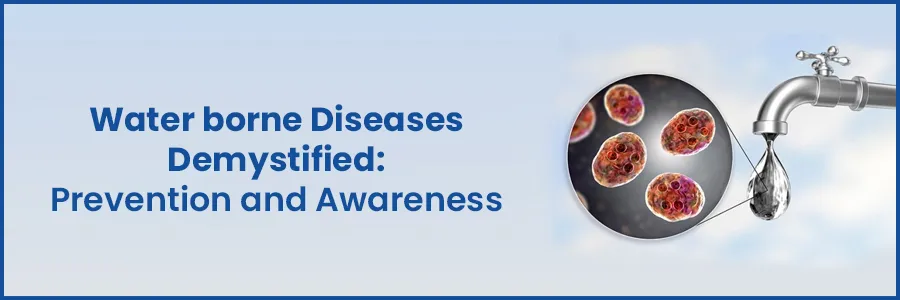
Waterborne Diseases Demystified: Prevention and Awareness
Water, the essence of life, is a vital resource for our existence. It sustains us, hydrates us, and keeps our bodies functioning optimally. However, contaminated water can turn into a silent assassin, carrying a host of dangerous diseases known as waterborne diseases. In this blog, we will delve deep into the world of waterborne illnesses, understanding their causes, symptoms, and most importantly, exploring effective prevention methods and awareness initiatives to safeguard public health.
Waterborne Diseases
Waterborne diseases are a group of infections caused by pathogenic microorganisms that contaminate water sources. These harmful microorganisms include bacteria, viruses, and parasites, and they can lead to a wide range of health issues, from mild gastroenteritis to severe and life-threatening conditions.
Secure your health with a second opinion. Make informed decisions and book your appointment today!
Get A Second OpinionCommon Waterborne Diseases and Their Symptoms
- Cholera: Caused by the bacterium Vibrio cholerae, cholera leads to severe watery diarrhea, vomiting, and dehydration, which can be fatal if left untreated.
- Typhoid Fever: Caused by Salmonella typhi bacteria, typhoid fever results in high fever, stomach pain, headache, and weakness.
- Hepatitis A: This viral infection affects the liver, causing symptoms like jaundice, fatigue, and abdominal pain.
- Gastroenteritis: Gastroenteritis, caused by various viruses and bacteria, leads to stomach cramps, diarrhea, vomiting, and fever.
- Cryptosporidiosis: Caused by the parasite Cryptosporidium, this disease affects the intestines, causing diarrhea, stomach cramps, and nausea.
Preventing Waterborne Diseases
- Safe Drinking Water: Access to safe drinking water is crucial in preventing waterborne diseases. Governments must invest in water treatment and purification systems to ensure clean water reaches all communities.
- Boiling Water: Boiling water before consumption is an effective method to kill harmful microorganisms and make it safe for drinking.
- Water Filtration: Using water filters at home can help remove impurities and pathogens, providing an additional layer of protection.
- Hand Hygiene: Proper handwashing with soap and clean water is a simple yet powerful way to prevent the transmission of waterborne diseases.
- Sanitation: Proper disposal of human waste and maintaining clean surroundings are essential to prevent water contamination.
- Vaccinations: Vaccines for diseases like cholera and hepatitis A can provide immunity and reduce the risk of infection.
- Avoiding Contaminated Water Bodies: Avoid swimming or using water bodies for recreational purposes that are known to be contaminated.
- Educational Awareness: Conducting educational campaigns and workshops to inform people about waterborne diseases and preventive measures can empower communities.
The Importance of Awareness Initiatives
Raising awareness about waterborne diseases is vital in preventing outbreaks and protecting public health. Educational campaigns should target schools, rural areas, and vulnerable populations, where access to information and resources may be limited.
Ready to take control of your health journey? Book your appointment now and start your path towards wellness today!
Book an AppointmentFrequently Asked Questions
Waterborne diseases are infections caused by pathogenic microorganisms that contaminate water sources. These microorganisms include bacteria, viruses, and parasites, which can lead to various health issues when consumed or exposed to contaminated water.
Waterborne diseases spread through the ingestion of contaminated water, often due to inadequate water treatment or poor sanitation practices. They can also spread through recreational activities in contaminated water bodies or by consuming food prepared with contaminated water.
Symptoms of waterborne diseases can vary depending on the specific illness. Common symptoms include diarrhea, vomiting, stomach cramps, fever, nausea, fatigue, and dehydration.
Common waterborne diseases include cholera, typhoid fever, hepatitis A, gastroenteritis, and cryptosporidiosis.
You can prevent waterborne diseases by accessing safe drinking water from reliable sources. Boiling water before consumption, using water filters, practicing proper hand hygiene, and maintaining good sanitation practices are essential preventive measures.
Water filtration helps remove impurities and harmful microorganisms from water, making it safer for drinking and other uses. Filtration systems can be installed at home or implemented on a larger scale in communities.
Vaccines are available for certain waterborne diseases like cholera and hepatitis A. Vaccination can provide immunity and reduce the risk of infection.
Water contamination can occur due to sewage leaks, agricultural runoff, industrial discharges, and improper waste disposal. Natural disasters like floods and hurricanes can also lead to water contamination.
Handwashing with soap and clean water is a simple yet effective way to prevent the transmission of waterborne diseases. It helps remove harmful microorganisms from hands, reducing the risk of ingestion when eating or touching the face.
If you suspect a waterborne disease outbreak, it is essential to report it to the local health authorities immediately. Follow their instructions, avoid using contaminated water, and seek medical attention if you experience any symptoms.
You can raise awareness about waterborne diseases by organizing educational campaigns, workshops, and seminars. Use posters, pamphlets, and social media to disseminate information about prevention and good hygiene practices.
Swimming in natural water bodies may pose a risk if the water is contaminated. It is essential to check the water quality and advisories before swimming and avoid areas known to be polluted.
Yes, waterborne diseases can affect pets and animals as well. Providing clean and safe drinking water for pets and maintaining proper hygiene practices can help prevent infections.
Waterborne diseases can be more prevalent in regions with inadequate water infrastructure and sanitation facilities. During rainy seasons or natural disasters, the risk of water contamination and disease outbreaks may increase.
